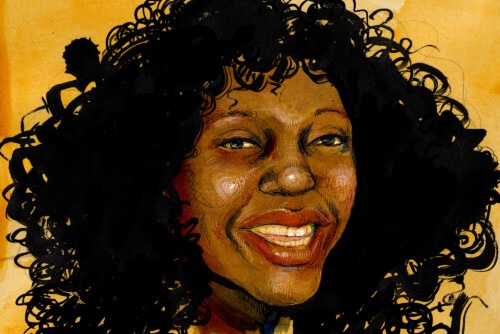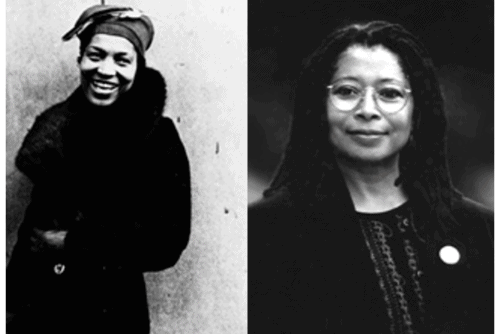A response to the panel “The Multiple Futures of Gender and Sexuality Studies” at the conference Activism and the Academy: Celebrating 40 Years of Feminist Scholarship and Action. Watch the video here:
I would like to reflect on the panel through the agendas suggested by the title and the themes that emerged in the presentations and in the Q&A. There are at least three ideas that provide a through line for the panel discussion—gender and sexuality as heterogeneous analytical and political modes; informalization as a possible institutional practice; and what we might call “the unfinished” as a productive principle of discourse and institutional being. These are themes that were offered very provocatively in the presentations made by Kandice Chuh, Sarita See, and Ann Pelligrini.
In Chuh’s presentation, she asked us to distinguish between institutionalization as a process that can generate new critiques, associations, and domains for minority discourse and institutionality as a discursive practice that engenders a desire for institutional territory, permanence, and recognition. Interrogating the economic as the horizon of institutional being, Ann Pellegrini posited interdisciplinary fields such as women’s studies, ethnic studies, queer studies, and postcolonial studies as domains that can and should produce forms of value incommensurate with the economic values promoted by corporate sectors of the contemporary university. In her own analysis of the hegemonic practices of the American university, See addressed interdisciplinary critiques of gender, sexuality, race, and ethnicity as locations whereby critical formations can move away from and foster alternatives to an adaptive intellectual and institutional center that ingratiates rather than simply repels minority difference.
Each of the presentations engaged dominant discourses and practices within the contemporary university and its interdisciplinary sites out of a concern for developing analyses and interventions that break from the dominant and its manipulations of minority difference. Thus, from the vantage point of minoritized subjects who—because of the formal incorporation of interdisciplinary fields—have come of age within rather than outside of the university, each speaker is concerned with the reorganization of knowledge and the transformation of institutional practice within the shadow of programmatic formalization. As Lisa Duggan said in her opening remarks, this formalization currently sets the terms for institutional reorganization and abolition.
One of the main impediments to the kind of critical reorganization and transformation called for by the panelists and one of the components of formalization practiced by the academy has been the rise of the administrator as the central figure of the contemporary university. In The University in Ruins, Bill Readings discusses the administrator’s ascent, arguing:
The central figure of the University is no longer the professor who is both scholar and teacher but the provost to whom both these apparatchiks and the professors are answerable…. The administrator will have been a student and a professor in his time, of course, but the challenge of the contemporary University is a challenge addressed to him as administrator. 1
The interdisciplinary counterpart to this narrative can be found in the institutional processes that now take scholars of minority difference as the eventual administrators of the contemporary US academy. In the context of a university system changed by student protests and affirmative action policies, administrators will have been minoritized students and professors in their time as well as people who will have hailed from critical investigations of minority difference. This trajectory from intellection to administration works to normalize the conditions whereby interdisciplinary faculty, students, and scholarship become answerable to an increasingly administrative future.
The privileging of the administrator as the pivot of academic relations has, therefore, also meant the triumph of formalization—the crowning of what Chuh engages as “institutionality;” what Pellegrini refers to as “economic value;” and what See discusses as “the center.” These categories and their related discourses have made our formal adherence to them the basis of our worth and practice in the academy. Formalization, in this regard, not only denotes the formal incorporation and establishment of interdisciplinary programs, centers, and departments, but the ascendancy of administration as the horizon by which we measure and evaluate our work and ourselves. By way of example, we see formalization in our belief that funding streams and departmentalization, for instance, are the primary ways to achieve impact and relevance within the academy. But we have also seen the repercussions of formalization—the fomenting of interest politics among interdisciplinary constituencies; the normalization of inquiries around race, sexuality, gender, and so on; and the increasing deactivation of critical intellectual production as the way in which we assess our texts and practices within the university.
Hence, the ascendancy of the administrator as the central figure of the university has produced a crisis like none other, the effect of which has been the insulation of the university from critical reorganization and transformation. In the figure of the administrator we find the symbol of and the metonym for the university’s understanding of formalization as the point of minority difference. That understanding can be witnessed in the privileging of economic value as well as the institutional and discursive production of an intellectual center that appraises all questions and arguments based on their potential conformity to that center.
Making the administrator the central figure of the university has changed what it means to be in the university. Being in the university—in the time of the administrator—has been turned into a mere referendum about whether we accept or reject the university. 2 This way of being in the university is diametrically opposed to how the social movements of the sixties and afterward understood what it meant to be in the academy. As diverse and as contradictory as those movements were, they based their principles of participation and evaluation on the idea that everything could be rewritten, that knowledge could be reorganized, and that institutions could be changed for the good of minoritized communities. For the most part, they addressed the university as an intellectual and institutional challenge rather than an administrative one.
In this regard, the ascendancy of the administrator is much more than the corporation’s seduction of the university. Making the administrator the central figure of the university represents the attempt to expel intellectual reorganization and institutional transformation from the horizons of social practice. If turning the administrator into the central figure of the university has been a way of alienating what we—à la Barthes—might call the “writerly” functions of minority difference, then our very status as historical and political subjects is at stake in this latest phase of the American academy. The over-prioritization of the administrator has been one of the ways in which we have been blocked from the co-constitutive magic of intellectual and institutional reorganization.
In this context, we might experiment with informalization as an intellectual and institutional strategy. As such, informalization does not suggest retreat or resignation to the institutional status quo. Instead, it is a desire for strategies that might offer different ways of being in the academy and alternative modes for assuming institutional struggles—assuming them without yielding to the legislated terms of institutional engagement. Informalization might denote a set of tactics designed to remake and remobilize energies for the reorganization of knowledge and the transformation of institutions, remaking and remobilizing those energies without presuming that we need formal authorization and certification to do so. If formalization has provided the conditions for our ironic alienation from the academy, an alienation built from our sense that we are “intransitive” subjects who cannot claim the institution as an object ready for revision, then informalization might be a new starting place that could help us redraft and reclaim the university. What Baldwin said of the black writer’s relationship to language and race applies to our intellectual and institutional predicament: “Writers are obliged, at some point, to realize that they are involved in a language which they must change. And for a black writer in this country to be born into the English language is to realize that the assumptions on which the language operates are his enemy.” 3 Informalization means that we are involved in institutions that we must change, that we are incorporated into modes of practice that will do harm to us and our critical visions. Our magic lies, therefore, not so much in the erection of programs, centers, departments, and majors but in our development as people who can use texts to create new intellectual and institutional communities.
Thus, the possibility of having multiple futures for gender and sexuality depends on our ability to resume and redouble our efforts to reorganize knowledge and re-maneuver institutions. Such a possibility means that the institution will always be unfinished and available for rereading and rewriting. “Unfinished business,” as the panelists and organizers deploy it, is not simply an observation about the status of feminist work. It is also the sense that our work is always and necessarily incomplete if we are going to prioritize production (i.e., institutionalization) rather than products (i.e., institutionality). This sense of the unfinished is a rebellion against the hegemonic understanding of women’s studies and ethnic studies. Discussing those fields and suggesting a powerful notion of the “unfinished” as an interdisciplinary strategy, Laura Hyun Yi Kang writes, for instance, “Rather than an innovative or finished achievement, I would cast their widely heralded ‘interdisciplinarity’ as an ongoing problematic and contestation about their proper and most productive location in relation to the academic disciplines.” 4 We might think of informalization as part of that ongoing contestation of and inquiry into the most productive sites for institutional transformation and intellectual reorganization. Moreover, we might approach it as that place where the overconfidence of formalization must reckon with the wisdom of the unfinished.
- Bill Readings, The University in Ruins (Cambridge and London: Harvard U P, 1996) 8.[↑]
- Readers will note here my reworking of Barthes’s argument in S/Z: “Our literature is characterized by the pitiless divorce which the literary institution maintains between the producer of the text and its user, between its owner and its customer, between its author and its reader. This reader is thereby plunged into a kind of idleness—he is intransitive; he is, in short, serious: instead of functioning himself, instead of gaining access to the magic of the signifier, to the pleasure of writing, he is left with no more than the poor freedom either to accept or reject the text: reading is nothing more than a referendum.” See Roland Barthes, S/Z, trans. Richard Miller (New York: Hill and Wang, 1974) 4. [↑]
- James Baldwin, “On Language, Race, and the Black Writer” in The Cross of Redemption: Uncollected Writings, ed. Randall Kenan (New York: Pantheon, 2010) 114.[↑]
- Laura Hyun Yi Kang, Compositional Subjects: Enfiguring Asian American Women (Durham and London: Duke U P, 2002) 21.[↑]



